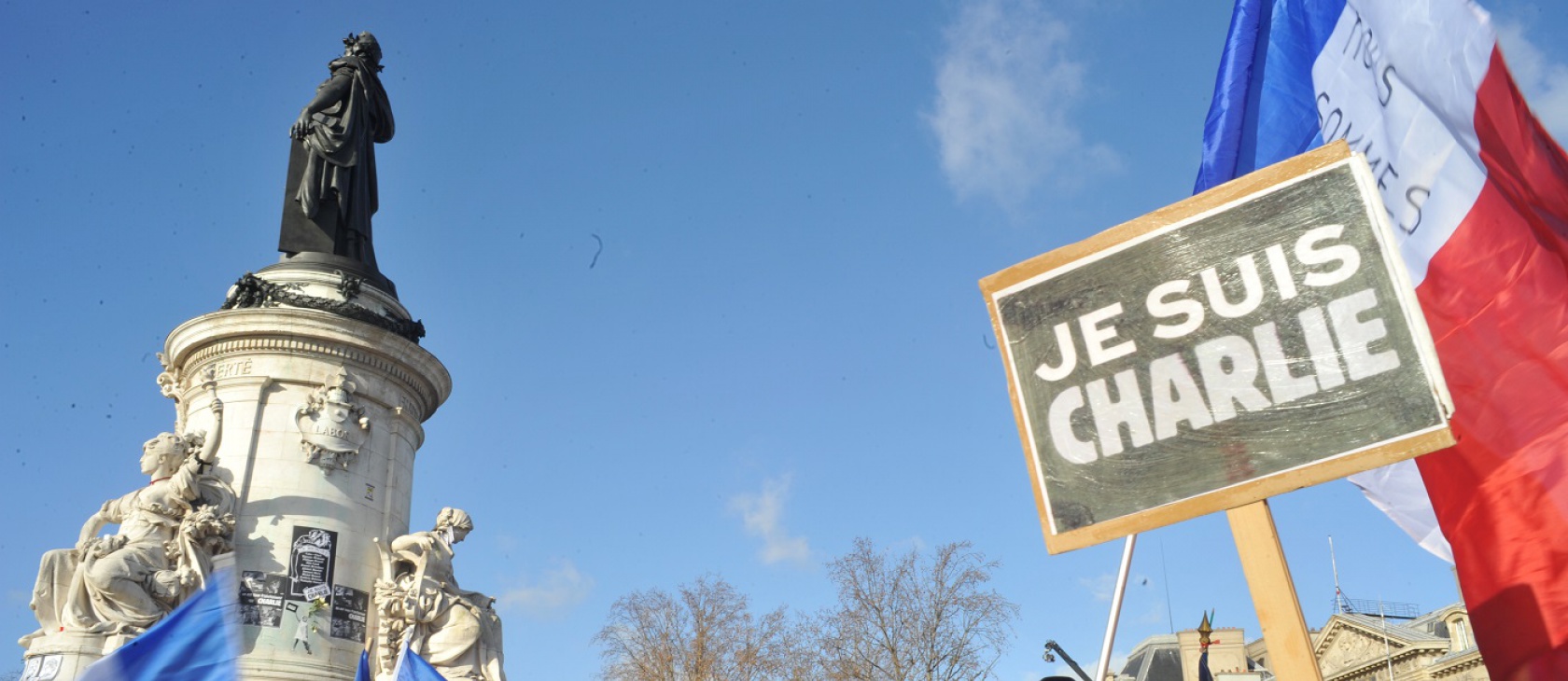At the start of the Syrian migration crisis, an Israeli security official warned of a coming “European intifada.” Few noticed it at the time. But after a series of attacks on largely Jewish targets in France and Belgium, the new reality finally hit home in January 2015, when armed men opened fire at the Paris offices of the satirical newspaper Charlie Hebdo. Since then, terrorist atrocities have escalated through Paris, Nice, Belgium, Sweden, Berlin, and London. They include the murder of a priest by two Islamists in Normandy as he was saying Mass.
Charlie Hebdo is a tedious and tasteless publication that makes fun of dead children and has predictable 1968 views on almost everything, except one of the most sacred: criticism of Islam. The day of the massacre Hebdo featured as its front page a caricature of Michel Houellebecq, whose controversial new novel was published that week. Soumission is set in a France in the near future in which an Islamist party has come to power with the connivance of both the Left and Right in order to defeat the nativist National Front. Houellebecq, already in trouble for criticising France's second largest religion in a previous work, has since moved to Ireland, seeing France as no longer safe. Soumission became a mega-bestseller. Also topping the charts that week was a polemic by Éric Zemmour, a journalist of Jewish-North African descent who has criticised mass immigration and the “demographic tsunami” it has brought.
The recent attacks in Manchester and London came as another important book was selling in vast numbers, The Strange Death of Europe by Douglas Murray, which has spent weeks at the top of the Sunday Times charts despite this subject being not the sort of thing one talks about in polite company. Murray's book follows James Kirchick's equally bleak-sounding The End of Europe: Dictators, Demagogues, and the Coming Dark Ages. In his book, Kirchick warns:
A Europe unmoored from the Enlightenment values it brought to the world, ignorant of and unwilling to protect its civilizational achievements, captive to chauvinist demagogues, indisposed to defend itself, bereft of its Jews, estranged from America, cowed before Russia, and reverted to its traditional state of nature with nations pursuing mercenary self-interest at the expense of unity would not only spell the end of Europe as we know it. Such a collapse would usher in nothing less than a new dark age.
Despite this, Kirchick is more optimistic than the title suggests. He concludes that the continent may get out of its current mess, if it can pool its resources and enjoy closer integration.
Others are not so optimistic. In Germany, historian Rolf Peter Sieferle has made even more of a splash. His account of German political psychology and its effects, Finis Germania, has enjoyed good sales just as it has been roundly condemned by the prestige press. Die Zeit called it a book of “brazen obscenity.” (He has not been able to enjoy his surprise bestseller, having taken his own life last September.)
A former socialist who grew disillusioned with his generation's naivety, Sieferle wrote that “[a] society that can no longer distinguish between itself and the forces that would dissolve it is living morally beyond its means.” In fact, he argued, Germans actually want to disappear because of a belief that Germans are uniquely guilty due to the Holocaust – that they carry a blood guilt as “the absolute enemies of our common humanity,” becoming “a scapegoat people.”
This was perhaps why in 2015 German Chancellor Angela Merkel made the momentous decision to open her nation’s borders. The numbers involved, and the future implications for our continent, are staggering; the reasons for her decision remain a mystery. Earlier that year the chancellor had told Reem Sahwil, a 14-year-old Palestinian girl who wanted to stay in Germany, that if she allowed Sahwil’s family to stay in Germany, all Africans would want to join them. Germany “cannot cope with that,” she said.
Many in the German media criticised the coldness of Chancellor Merkel's response and so when in late August migration pressure looked like overwhelming Greece and Italy, the Germans snapped. In August 2015, Merkel announced her open door policy, cloaking it in moral terms. “Universal civil rights were so far tied together with Europe and its history,” she said. “If Europe fails on the question of refugees, its close connection with universal civil rights will be destroyed. It won't be the Europe we imagine.” As she told them, “Wir Schaffen das” – “We can do this.” What followed were scenes of jubilation among Germans as they welcomed refugees into their towns, as Murray writes:
As the trains came into the stations and the migrants got off and went through the crowds some locals wolf-whistled and gave them high-fives. Human chains of volunteers handed out food and gifts, including sweets and teddy bears for the children. It was not just an expression of the Willkommenskultur ("welcoming culture") that Germany says it likes to practise. These migrants were not merely being welcomed. They were being celebrated, as though they were the local football team returning triumphant, or heroes returning from a war.
In just a year Germany accepted a total of 1.1 million migrants. Most were not Syrian, and most were not refugees as defined by the UN. Most were young men, and most intended to bring their family with them; once those relatives are taken into account, Germany will have experienced nothing short of a demographic revolution. At a time when low-skilled jobs are disappearing this is a potential explosive cocktail.
We imported religious people because of the absence of our own faith.
Kirchick wrote that “historical guilt for the crimes of Nazism inspired an open-door refugee policy as ill considered as it was well intentioned, the negative consequences of which will be felt for generations.” Among the new Germans was the Sahwil family, which was given permission to stay at the end of 2015. The young girl gave a little-noticed interview in which she said she hoped to return home one day ... when Israel “is no longer there.”
Merkel's executive decision was only an acceleration of a long-running trend that began after the Second World War with the first migrant workers in Britain, France, Germany, and the Low Countries. They were there for economic reasons, and people did not expect them to stay, but as Western Europe became diverse, much to the discomfort and opposition of people outside the political class, all sorts of rationalizations were offered. Yet as Murray accurately points out, at the heart of this was a spiritual void.
On a profound level, we imported religious people because of the absence of our own faith. Western Europe took immigrants from the Islamic world just as it was adopting bohemian culture mores, characterised by more liberal attitudes to drug and alcohol use, and extra-marital sex. The new “bourgeois-bohemian” middle class combined this countercultural individualism with the materialistic values of capitalism. Across 10 Western European countries, church attendance fell from 38.4 to 16.6 percent between 1975 and 1998. Europe became a consumerist paradise with an economic model that depended on demographic growth, which only religious societies can provide. In France, Caucasian women who practise religion have a half-child fertility advantage over the non-religious; in Austria self-identified atheists have fertility rates of just 0.86 children per woman.
It was assumed, if unspoken, that Muslim migrants – dressed in suits, often moderate beer drinkers – would become godless or at least less observant upon breathing European air, their children even more so. It's safe to say there are now few people left who have not been disabused of this notion. Muslims arrived in a continent going through a revolutionary social change which made the path to integration complex and difficult. Unsurprisingly their sons, feeling the sense of alienation common to second-generation migrants sometimes feel little attachment to the national culture, preferring a strong, global brotherhood of faith that offers the comfort of certainty and the heroic narrative. And yet when the UK government repeatedly emphasises “British values” during anti-extremism initiatives, they find it hard to articulate those same values without the obvious one: Christianity. Instead, they limply define Britishness by tolerance and diversity, almost as if these things are a replacement faith.
… Which they sort of are. Diversity offers Europeans a form of redemption, something heavily influenced by the tragedy of 1914 to 1945 but also deeply linked to our guilty culture. When the body of three-year-old Syrian boy Aylan Kurdi, a Syrian washed up on a Turkish beach, it became the most powerful image of the decade. Yet in the Arab world, there was little sense that this was their fault. As Murray writes, “there was not anything there remotely like the introspection and self-accusation indulged in by Western politicians and media.” Indeed, the Gulf Arab states have taken virtually no Syrian refugees.
Europe has a guilt and savior complex. As a result, it seems to be replacing the atonement of the Savior’s death with its own.
Much of Europe's behaviour since 1945 has been an attempt to exit history, a tired continent looking for peace and inner calm, sick of the wars of religion, ideology and race that have dogged it for centuries; in doing so it can also finally achieve its redemption. The tragedy is that, in doing so, it has almost certainly ensured that their posterity will not get that peace. Murray concludes that “[i]t is always possible that the tide of faith that began its long, withdrawing roar of retreat in the nineteenth century will come back in again.” One must hope. Together with their traditional faith, Europeans must recover their lost Burkean notion of society being a compact between the living, the dead and those yet unborn.
(Photo credit: Sebastien Amiet;l. This photo has been cropped. CC BY 2.0.)




